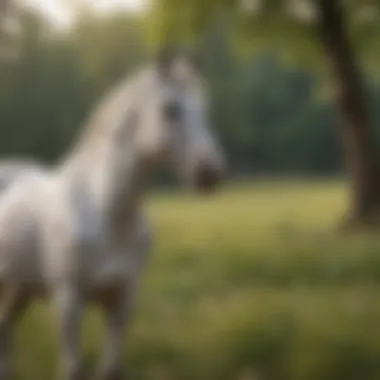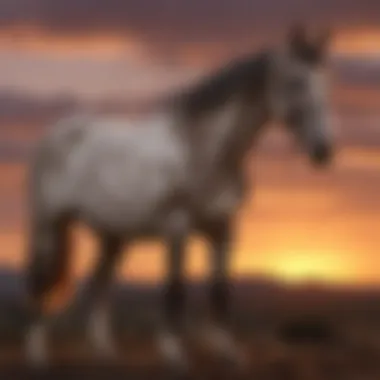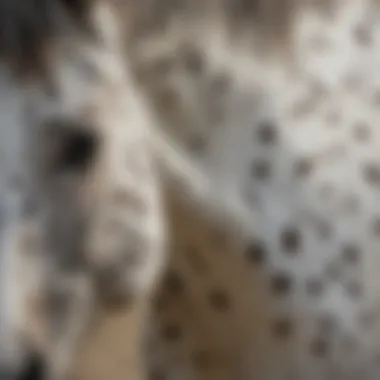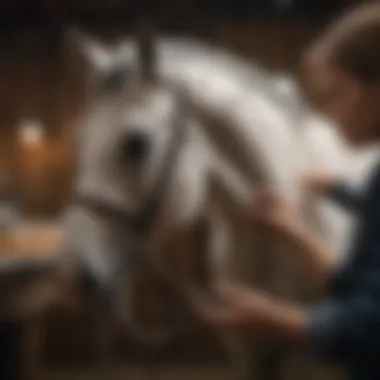Unveiling the Financial Realities of Owning an Appaloosa Horse


Pet Care Essentials
When it comes to owning an Appaloosa horse, ensuring their daily nutrition requirements are met is crucial. These majestic animals have specific dietary needs that must be carefully attended to for their overall well-being. It's essential to provide them with a balanced diet rich in quality hay, grains, and supplements.
Taking an Appaloosa horse out for regular exercise and playtime is not just for recreation but also for their physical and mental health. Engaging them in activities that stimulate their natural instincts and allow them to stretch their muscles is key to maintaining their vitality.
Grooming an Appaloosa horse is more than just keeping them clean - it's a bonding experience. Regular grooming sessions help in checking for any abnormalities in their coat, skin, or hooves, ensuring early detection of any health issues.
Regular health and wellness check-ins with a veterinarian are essential for monitoring an Appaloosa horse's overall health. This includes vaccinations, dental care, deworming, and any specific health concerns that may arise.
Behavior & Training
Understanding your Appaloosa horse's body language is the first step towards effective communication. By observing their gestures, expressions, and movements, you can gauge their moods and preferences, strengthening your bond with them.
Basic training techniques such as halter training, leading, and groundwork are essential for establishing a respectful and cooperative relationship with your Appaloosa horse. Consistency, patience, and positive reinforcement are key elements in their training regimen.
Addressing behavioral concerns promptly is crucial in maintaining a harmonious interaction with your Appaloosa horse. Whether it's dealing with spooking, biting, or kicking, employing positive training methods and seeking professional help when needed can help address such issues.
Socialization plays a vital role in shaping an Appaloosa horse's demeanor. Introducing them to various environments, people, and animals from a young age can help them become well-rounded and confident individuals.
Pet Home Environment
Creating a pet-friendly space for your Appaloosa horse involves providing them with a safe and enriching environment. Fencing the pasture securely, removing any toxic plants, and ensuring proper shelter are paramount for their safety.
Implementing safety measures and identifying hazards in their surroundings can prevent accidents and injuries. Regularly inspecting their living area for any potential risks and making necessary modifications can create a secure space for your horse.
Choosing the right toys and accessories for your Appaloosa horse can keep them engaged and mentally stimulated. From chew toys to treat dispensers, providing them with interactive toys can prevent boredom and encourage natural behaviors.
Setting up a comfortable resting area with adequate bedding and shelter is essential for your Appaloosa horse's well-being. A cozy stall or shelter that offers protection from the elements is crucial for their comfort and relaxation.
Pet Health Issues
Recognizing signs of illness in your Appaloosa horse requires attentiveness to their behavior, appetite, and physical condition. Any changes in their demeanor or health should be promptly addressed by a veterinarian.
Preventative care measures such as regular vaccinations, parasite control, and dental checks are vital for maintaining your Appaloosa horse's health. Following a preventive healthcare schedule can help ensure they lead a long and healthy life.
Being aware of common ailments that may affect Appaloosa horses, such as colic, lameness, or skin conditions, can aid in early detection and timely treatment. Educating yourself on these conditions and their symptoms is essential for prompt intervention.
Emergency preparedness is crucial for any Appaloosa horse owner. Having a well-equipped first aid kit, access to veterinary care, and an emergency evacuation plan can potentially save your horse's life in unforeseen circumstances.


Introduction
In the intricate world of equine management, understanding the financial aspect of owning an Appaloosa horse is paramount. The financial commitments involved in caring for these majestic animals go beyond the initial purchase cost and delve into ongoing maintenance expenses that prospective owners must be acutely aware of. This article aims to unravel the complex tapestry of costs associated with Appaloosa horse ownership, offering valuable insights to those considering welcoming these distinctive creatures into their lives.
Understanding the Financial Investment
Determining Factors for Appaloosa Horse Costs
When it comes to determining the costs of owning an Appaloosa horse, various factors come into play. The lineage, age, training level, and overall health of the horse all contribute significantly to its price tag. Each of these elements requires meticulous consideration before making a financial commitment, as they directly impact the overall cost of ownership. Understanding these determining factors is crucial for prospective owners to make informed decisions and ensure they are prepared for the financial responsibilities that come with owning an Appaloosa.
Initial Purchase Price
The initial purchase price of an Appaloosa horse is often a significant financial investment. Factors such as age, bloodline, and color patterns play a pivotal role in determining the horse's value. Prospective owners need to be well-versed in evaluating these aspects to avoid overpaying or underestimating the true worth of the horse they are interested in. Assessing the initial purchase price requires a keen eye for detail and a comprehensive understanding of how different factors influence the overall cost of acquiring an Appaloosa.
Ongoing Maintenance Costs
Beyond the one-time expense of acquiring an Appaloosa horse, owners must also consider the recurring costs associated with their care. From feed and veterinary expenses to farrier services and insurance fees, the long-term financial commitment of owning an Appaloosa can be substantial. Understanding the ongoing maintenance costs allows prospective owners to budget effectively and plan for the continuous care required to keep their horse in optimal health.
Significance of Research and Planning
Evaluating Budget Constraints
One of the fundamental aspects of ensuring a successful Appaloosa ownership experience is evaluating budget constraints. By meticulously mapping out the financial resources available for purchasing and caring for the horse, owners can avoid potential financial strain in the future. Understanding and acknowledging budget constraints early on in the process is essential for long-term financial stability and responsible horse ownership.
Exploring Ownership Considerations
Exploring ownership considerations involves a deep dive into the practicalities and responsibilities that come with owning an Appaloosa horse. Factors such as available time for care, space requirements, and potential training needs all play a crucial role in determining whether Appaloosa ownership is a suitable choice. By exploring these considerations thoroughly, prospective owners can gain a realistic expectation of what owning an Appaloosa entails and make informed decisions based on their individual circumstances.
Market Trends and Variations
Regional Price Disparities
Regional price disparities in the Appaloosa horse market can be influenced by a variety of factors, including demand, availability, and breed popularity in specific geographical areas. Understanding these variations is essential for prospective owners looking to make a well-informed purchase decision. By analyzing regional price disparities, individuals can gain insights into the dynamics of the market and potentially leverage this knowledge to secure a favorable deal on an Appaloosa horse.
Breed Lineage Impact on Cost
The impact of breed lineage on the cost of an Appaloosa horse is significant. Bloodlines that boast prestigious pedigrees often command higher prices due to their lineage's reputation for exceptional traits and performance. Understanding how breed lineage influences cost is essential for prospective owners who value heritage and genetic lineage in their decision-making process. By delving into the intricacies of breed lineage impact on cost, individuals can gain a deeper appreciation for the nuances of the Appaloosa horse market and make well-informed choices when selecting their equine companion.
Factors Affecting Appaloosa Horse Costs
When it comes to understanding the financial investment required for owning an Appaloosa horse, delving into the factors affecting their costs is crucial. Various elements significantly influence the overall expenses associated with these majestic animals. From the age and training level to color patterns, bloodlines, health, and conformation, each aspect plays a pivotal role in determining the worth of an Appaloosa horse. By analyzing these factors meticulously, prospective owners can make informed decisions and prepare for the financial responsibilities that come with owning such unique breeds.


Age and Training Level
Young Versus Mature Horses
A key aspect influencing the cost of an Appaloosa horse is the age and training level. The difference between young and mature horses carries substantial significance in the overall investment. Young horses, despite potential longevity and trainability, often require intensive care and consistent training to reach their full potential. On the other hand, mature horses may already possess advanced skills and require less initial training, but their age can also bring about health considerations. Understanding the dynamics between young and mature horses is essential for prospective owners to decide which age group aligns best with their preferences and budget.
Impact of Training and Skills
The impact of training and skills further refines the financial commitment required for Appaloosa horse ownership. A well-trained horse with advanced skills commands a higher price due to its versatility and performance capabilities. Effective training not only enhances the horse's value but also contributes to a harmonious relationship between the horse and its owner. However, investing in training also incurs additional costs, ranging from hiring professional trainers to covering training equipment expenses. Evaluating the impact of training and skills is indispensable for owners seeking a well-rounded and skilled Appaloosa horse that meets their equestrian needs.
Color Patterns and Bloodlines
Rare Coloration Influence
The color patterns and bloodlines of an Appaloosa horse significantly influence its cost. Rare colorations, such as intricate spotting and unique coat patterns, can elevate the horse's aesthetics and market value. Breeders often emphasize rare coloration breeding programs to produce visually striking offspring with distinct markings. However, acquiring a horse with rare coloration comes at a premium due to its exclusivity and desirability among horse enthusiasts. Understanding the exquisite appeal of rare colorations and their impact on pricing is essential for individuals seeking a visually captivating and unique Appaloosa companion.
Pedigree and Genetic Factors
Another critical aspect shaping Appaloosa horse costs is the pedigree and genetic factors associated with the breed. A horse's lineage, including its parentage and ancestral background, plays a significant role in determining its value and potential. Strong pedigrees with successful lineage and proven genetic traits often command higher prices, reflecting the horse's superior genetic inheritance. Breeders carefully assess genetic factors to produce offspring with desirable traits, ensuring the continuation of exceptional bloodlines. Evaluating the pedigree and genetic makeup of an Appaloosa horse is paramount for those seeking a horse with a competitive edge and the potential for future breeding endeavors.
Health and Conformation
Vet Check Considerations
Prioritizing the health and conformation of an Appaloosa horse is essential in assessing its overall worth and maintenance costs. Vet check considerations play a vital role in determining the horse's current health status, identifying any underlying medical issues, and projecting future healthcare requirements. Regular veterinary check-ups, vaccinations, and preventive care are indispensable for ensuring the well-being of the horse, mitigating potential health complications, and optimizing its longevity. A thorough understanding of vet check considerations is imperative for responsible horse ownership and effective management of healthcare expenses.
Effect of Conformation on Price
The conformation of an Appaloosa horse significantly influences its market value and long-term expenses. Conformation refers to the horse's physical structure, including its skeletal frame, musculature, and overall body proportions. A horse with excellent conformation is not only aesthetically pleasing but also exhibits enhanced performance capabilities and lower susceptibility to certain health issues. Conversely, horses with conformational defects may face challenges in competitive disciplines and may require specialized care or corrective measures, impacting their resale value and ongoing maintenance expenses. Evaluating the effect of conformation on price is essential for individuals seeking a structurally sound and athletically capable Appaloosa horse.
Financial Planning for Appaloosa Ownership
In this section, we delve into the critical aspects of financial planning for owning an Appaloosa horse, which is indispensable for prospective horse owners. Understanding the financial commitments involved in caring for these majestic animals is paramount to ensure a sustainable and fulfilling ownership experience. Financial planning provides a roadmap for managing the costs associated with owning an Appaloosa horse, covering various expenses from upfront purchase to regular maintenance.
Budget Allocation and Long-Term Expenses
Feed, Farrier, and Veterinary Costs
Exploring the financial implications of feed, farrier services, and veterinary care is integral to effective budget allocation for Appaloosa ownership. These expenses are foundational to the health and well-being of the horse, encompassing the costs of nutrition, hoof care, and medical attention. Proper nutrition through quality feed, regular farrier visits for hoof maintenance, and veterinary care ensure the optimal health and performance of the horse. Owners must allocate a significant portion of their budget to these essential costs to guarantee the Appaloosa's overall welfare.


Insurance and Emergency Funds
Discussing the significance of insurance coverage and emergency funds in financial planning for Appaloosa ownership sheds light on mitigating potential risks and unforeseen circumstances. Insurance safeguards against unexpected medical expenses and liability issues, offering financial protection in case of accidents or illnesses. Setting aside emergency funds allows owners to address immediate needs or emergencies without compromising the horse's well-being. Incorporating insurance and emergency funds into the budget ensures a comprehensive approach to managing long-term expenses and securing the Appaloosa's care.
Training and Competition Expenses
Investing in Professional Training
Investing in professional training for the Appaloosa horse is a strategic decision that can enhance the animal's skills, behavior, and overall value. Professional trainers provide specialized expertise and guidance to develop the horse's abilities, whether for riding, performance, or specific disciplines. Training programs tailored to the Appaloosa's unique characteristics and temperament yield long-term benefits in terms of behavior, responsiveness, and performance. Owners who prioritize professional training invest in the horse's development and potential, fostering a strong partnership built on trust and expertise.
Participation in Shows and Competitions
Participating in shows and competitions offers Appaloosa owners the opportunity to showcase their horse's capabilities, gain recognition, and engage with the equestrian community. Competing in various events allows horses to demonstrate their training, skills, and breed characteristics, contributing to their overall exposure and marketability. While participation entails costs related to entry fees, travel, and preparation, the experience enriches the horse's training journey and provides valuable insights for both the owner and the animal. Engagement in shows and competitions cultivates a dynamic and fulfilling experience for Appaloosa owners seeking to highlight their horse's prowess and accomplishments.
Resale Value and Future Considerations
Factors Impacting Resale Price
Evaluating the factors that influence the Appaloosa horse's resale price is crucial for owners considering future transitions or sales. Elements such as age, training level, health history, and breeding lineage play a significant role in determining the horse's market value. Rare color patterns, desirable bloodlines, and competitive achievements can elevate the horse's resale potential, positioning it favorably in the market. Understanding these factors enables owners to make informed decisions regarding training, care, and breeding strategies that can positively impact the horse's resale value.
Planning for the Horse's Future
Planning for the Appaloosa's future encompasses creating a roadmap for its continued care, well-being, and potential transitions. Owners must consider aspects such as retirement plans, breeding options, performance goals, and long-term care arrangements when outlining the horse's future trajectory. Developing a comprehensive strategy for the horse's future ensures a holistic approach to its management, encompassing health, training, and financial considerations. By proactively planning for the horse's future, owners can navigate potential challenges and opportunities with clarity and foresight, fostering a sustainable and fulfilling journey for the Appaloosa horse.
Conclusion
In the realm of understanding the financial investment associated with owning an Appaloosa horse, the conclusion serves as a pivotal piece that encapsulates the essence of the entire discourse. Delving into the complexities of not just the initial purchase price, but also the ongoing maintenance costs and the overarching considerations prospective owners must weigh, the conclusion brings forth a holistic view of the financial commitments inherent in caring for these majestic animals. It acts as a bridge connecting the various sections and insights explored throughout the article.
Summary of Cost Components
Total Cost Breakdown:
Total Cost Breakdown plays an integral role in dissecting the financial intricacies of owning an Appaloosa horse. By meticulously analyzing every expense, from initial purchase to long-term maintenance, it provides a comprehensive view of the overall investment required. The key characteristic of Total Cost Breakdown lies in its ability to offer transparency and clarity to prospective owners, aiding them in making informed financial decisions. One unique feature of Total Cost Breakdown is its ability to highlight hidden costs and unforeseen expenses, thus enabling better financial planning for the future.
Key Takeaways for Prospective Owners:
Key Takeaways for Prospective Owners distill the essential aspects that individuals considering Appaloosa horse ownership should keep in mind. These key points offer crucial insight into the financial commitments, responsibilities, and expectations associated with owning such a noble creature. The benefits of understanding these takeaways are multifaceted, ranging from financial preparedness to emotional readiness. One distinguishing feature of Key Takeaways for Prospective Owners is their ability to serve as a guideline for setting realistic expectations and establishing a strong foundation for a fulfilling ownership experience.
Final Considerations
Informed Decision-Making:
Informed Decision-Making emerges as a critical aspect in the landscape of Appaloosa horse ownership. By empowering individuals with comprehensive knowledge and data-driven insights, it equips them to make sound judgments regarding the financial implications and commitments required. The key characteristic of Informed Decision-Making is its transformative impact on prospective owners, enabling them to approach ownership from a position of knowledge and awareness. One unique feature of Informed Decision-Making is its ability to mitigate risks and uncertainties, fostering a sense of confidence and preparedness.
Commitment to Responsible Horse Ownership:
Commitment to Responsible Horse Ownership stands as the cornerstone of nurturing a wholesome relationship with these magnificent animals. Emphasizing the ethical obligations and care standards essential in horse ownership, this aspect underscores the importance of prioritizing the well-being and welfare of the Appaloosa horses. The beneficial nature of this commitment lies in its ability to foster a sense of stewardship and respect towards the creatures under one's care. A unique feature of Commitment to Responsible Horse Ownership is its capacity to create a symbiotic bond between owner and horse, grounded in trust, compassion, and mutual understanding.







